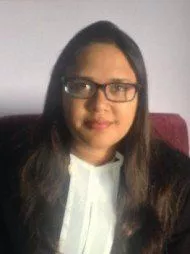
Advocate Reena Rao
Advocate Reena enrolled with the Bar Council of Delhi in 1994. She is a member of the Supreme Court Bar Association & Delhi High Court Bar Association.
Enrollment Number : D/507/1994
- Delhi High Court
- District Court, Karkardooma
- District Court, Patiala House
- National Commission (NCDRC)
- Supreme Court Of India
Recently Contacted Lawyers in Delhi

Advocate Sudershani Ray

Advocate Wg Cdr Ajit Kakkar (Retd)

Advocate Rajesh Rai

Advocate Vijay Tangri

Advocate Jaspreet Singh Rai

Advocate Aditya Parolia

Advocate Bhawana Pandey

Advocate Anshul Gupta

Advocate Peeyush Kaushik
Popular Reviews
There are no reviews yet for Advocate Reena Rao. Please consult the lawyer through LawRato if you wish to leave a review.
Questions Answered by Advocate Reena Rao
Q: How can a woman get help from the free legal aid of Supreme Court
1) How can a woman avail free legal aid services from supreme court to represent her case? 2) Can an aggrieved person directly approach the legal aid at supreme court. 3) Does any advocate on record reference is required to get an entry at supreme court when a person only want to meet the legal aid office only?
Advocate Reena Rao answered
Any person seeking legal service for filing or defending any action in the Supreme Court has to make an application in writing for seeking legal aid. Application forms are available on SCLSC website as well as in the front office of the SCLSC which the applicant can obtain free of cost. The applicant is also required to submit an affidavit on non-judicial stamp paper in support of the application for legal aid. The applicant can also contact the concerned High Court Legal Services Committee/Authority for obtaining the relevant forms of the SCLSC.The applicant is also required to submit all the relevant documents along with the duly filled in and signed application forms.Yes the aggrieved person can directly approach legal aid at SC.you can directly visit the legal aid office .
Q: What are the charges for name change in 10th and 12th mark sheet
how much total amount is required for changing/correcting name ( my name, father name and mother name) in 10th class certificate. *in 2012 i have completed my 10th *also i already corrected my name in 11th and 12th during school.
Advocate Reena Rao answered
THE FOLLOWING DOCUMENTS ARE REQUIRED :A. ONE PASSPORT SIZE COLOR RECENT PHOTOGRAPHSB. ID PROOFC. ADDRESS PROOFD. AFFIDAVITE. REQUIRED FORMS ETC. AS PRESCRIBED.F. ADVERTISEMENT IN ONE NATIONAL NEWSPAPER AND ONE LOCAL NEWSPAPER.If sending by post then Govt. fee in the form of Demand Draft drawn in favor of CONTROLLER OF PUBLICATION payable at DELHI from any Bank. Necessary fee may be deposited in cash at the counter if submitting personally.Government Fee: Rs. 1100/- for major and Rs. 1,400/- for minor. However, I, request you to please check from Office of Controller of Publications before making any payment/Demand Draft for exact amount.The Public dealing timings of this office is Monday to Friday (10:00 am to 1:00 pm and 2:00 pm to 4:00 pm). Since the form has to be submitted personally by the applicant at the counter or sent by registered post, submit the form in person so that in case of any discrepancy the same may be sorted out immediately and chances of rejection is avoided. After name is published in Government Gazette you can apply for name change in your documents with the concerned departments.
Q: Review petition seeking permission to file evidence not filed earlier
My chq was dishonoured but i still lost the case as my counsel did not submit the evidence of r mail correspondence for reasons known to him only. Npw, can i file review petition seeking permission to file evidence not filed earlier.
Advocate Reena Rao answered
It is the trial court before whom parties are required to put forward their evidence. But in three exceptional circumstances, additional evidence can be adduced before the appellate court, as provide Under Section 107(1)(d) read with Rule 27 of Order XLI of the Code. Or.41 R.27 reads as follows: “27. Production of additional evidence in Appellate Court. –(1) The parties to an appeal shall not be entitled to produce additional evidence, whether oral or documentary, in the Appellate Court. But if – a) The court from whose decree the appeal is preferred has refused to admit evidence which ought to have been admitted, or (aa) the party seeking to produce additional evidence, establishes that notwithstanding the exercise of due diligence, such evidence was not within his knowledge or could not, after the exercise of due diligence, be produced by him at the time when the decree appealed against was passed, or(b) the Appellate Court requires any document to be produced or any witness to be examined to enable it to pronounce judgment, or for any other substantial cause, the Appellate Court may allow such evidence or document to be produced, or witness to be exam med.(2) Whenever additional evidence is allowed to be produced, by an Appellate Court, the court shall record the reason for its admission.“It is against the spirit of the Code to allow a party to adduce additional evidence without fulfillment of either of the three conditions mentioned in Rule 27,”
Q: Which law applies to marriage done by two inter religion people
I belong to Sikh religion and my husband belongs to Hindu which act will be applied? my marriage took place according to Hindu religion. Second problem is in documents age of my husband is less than 21 so he do I go for marriage certificate, I need that urgently for visa purpose? I have Arya samaj mandir certificate
Advocate Reena Rao answered
The Special Marriage Act shall be applicable in order to provide a special form of marriage for the people of India and all Indian nationals in foreign countries, irrespective of the religion or faith followed by either party.There are three major objectives:1. To provide a special form of marriage in certain cases,2. to provide for registration of certain marriages and,3. to provide for divorce. • Any person can marry under this act irrespective of religion.• Hindus, Muslims, Buddhists, Jains, Sikhs, Christians, Parsis, or Jews can also perform marriage under the Special Marriage Act, 1954• Inter-religion marriages are performed under this Act.• This Act is applicable to the entire territory of India (excluding the state of Jammu and Kashmir) and extends to intending spouses who are both Indian nationals living abroad. • The parties have to file a Notice of Intended Marriage in the specified form to the Marriage Registrar of the district in which at least one of the parties to the marriage has resided for a period of not less than thirty days immediately preceding the date on which such notice is given. • After the expiration of thirty days from the date on which notice of an intended marriage has been published, the marriage may be solemnized, unless it has been objected to by any person.• The marriage may be solemnized at the specified Marriage Office.• Marriage is not binding on the parties unless each party states "I, (A), take thee (B), to be my lawful wife (or husband)," in the presence of the Marriage Officer and three witnesses. • Each party involved should have no other subsisting valid marriage. In other words, the resulting marriage should be monogamous for both parties. • The groom must be at least 21 years old; the bride must be at least 18 years old.• The parties should be competent in regards to their mental capacity to the extent that they are able to give valid consent for the marriage.• The parties should not fall within the degree of prohibited relationship.
Q: How to quash an FIR filed under 498a
Dear Sir/Madam, My wife filed a complaint in police station and FIR was registered under 498a/34/406 and after one month my wife called me and said i will not pursue FIR which she filed against me and gave her statement in writing to Police station in which she stated not to take any legal action against my husband and in laws family. Now i asked her to live with me only after quashing of FIR. Please quide me best way to quash. i dont want to go for any MOU or any other compromise deed in petition just because she filed the case. should i go for joint petition without MOU or any other way
Advocate Reena Rao answered
Quashing FIR 498 AFIR u/s 498A can be quashed in the High Courts before commencement of trial.Jurisdiction: Normal rule is that the offence shall ordinarily be inquired into and tried by a court within whose local jurisdiction it was committed.However, when it is uncertain in which of several local areas an offence was committed or where an offence is committed partly in one local area and partly in another or where an offence is a continuing one, and continues to be committed in more than one local area and takes place in different local areas as per Section 178, the Court having jurisdiction over any of such local areas is competent to inquire into and try the offence. Section 179 makes it clear that if anything happened as a consequence of the offence, the same may be inquired into or tried by a Court within whose local jurisdiction such thing has been done or such consequence has ensued.Grounds : 1. Vague Allegations2. Where the allegations in the first information Report taken on its face value and accepted in their entirety do not constitute the offence alleged.3. Where an allegation constitutes an offence but there is no evidence adduced. So lack of evidence is another ground.4. False allegations against relatives.5. Delay in filing charge sheet is also a good ground for quashing of FIR u/s 498A.
Frequently Asked Questions about Advocate Reena Rao
Can Advocate Reena Rao represent me in court?
Yes, Advocate Reena Rao can represent you in court. The lawyer is trained to present your case in the most effective way possible.
What should I bring to my initial consultation with Advocate Reena Rao?
When you meet with Advocate Reena Rao for an initial consultation, it is important to bring any relevant documents or information with you. This may include documents related to your legal issue, such as contracts or court orders, as well as any other relevant information, such as a list of questions or concerns you have about your case.
How do I prepare for my initial consultation with Advocate Reena Rao?
Before your initial consultation with Advocate Reena Rao, it can be helpful to think about the specific legal issue you are facing and any questions or concerns you have about your case. You should also gather any relevant documents or information that you think may be helpful in understanding your situation.
What should I expect during my initial consultation with Advocate Reena Rao?
During your initial consultation with Advocate Reena Rao, you can expect to discuss the specific legal issue you are facing and the details of your situation. Lawyer will ask you questions to get a better understanding of your case and will provide you with information about your legal options and any potential outcomes.
How do I communicate with Advocate Reena Rao?
It is important to communicate with Advocate Reena Rao regularly to stay updated on the progress of your case and to discuss any new developments or concerns you may have. You can communicate with the lawyer through phone calls, emails, or in-person meetings.
How much does it cost to hire Advocate Reena Rao?
The cost of hiring Advocate Reena Rao can vary widely. Some lawyers charge hourly rates, while others charge a flat fee for their services. Some also offer free initial consultations to discuss your case. Kindly contact the lawyer directly to enquire about the fee.



 659+ Lawyers are online
659+ Lawyers are online